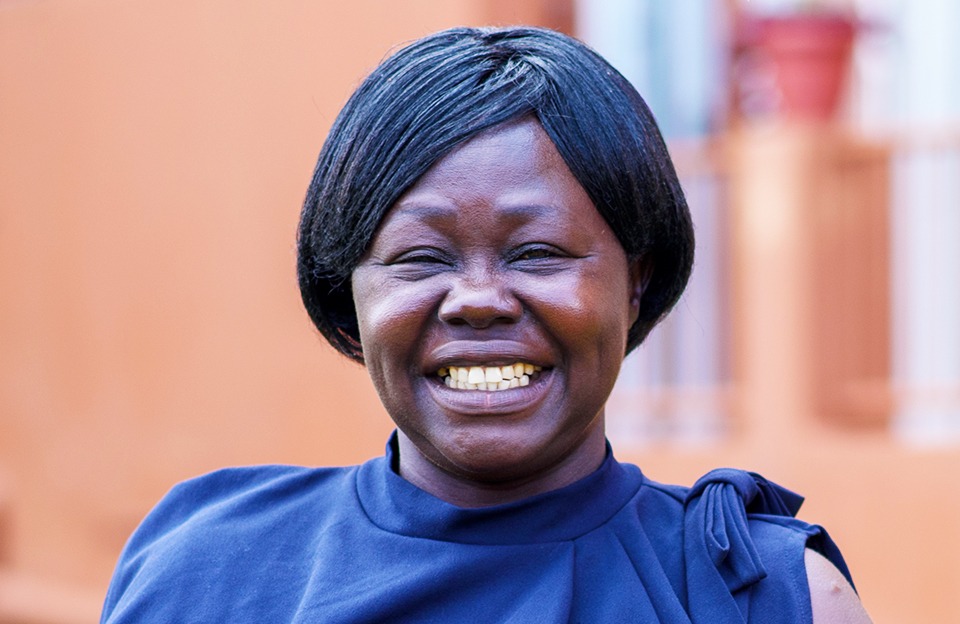From where I stand, Catherine Kwanje Micheal: "If more women are trained as peacebuilders, in the next 10 years the world will be more peaceful"
Catherine Kwanje Micheal aged 43 years is a 2-time refugee. In 1994, she fled into Uganda as a young girl, attended school in Uganda and in 2000 voluntarily returned back to her home town of Yei, in South Sudan hoping to settle down and rebuild her life.Date:

![]() Peace means Do No Harm. A peaceful society is a society without guns, where everyone lives without fear, where there is no corruption and no torture. My motivation to join peacebuilding work stems from the many years I have had to spend as a refugee. I need to see peace restored in my country so that I don’t have to be a refugee forever.
Peace means Do No Harm. A peaceful society is a society without guns, where everyone lives without fear, where there is no corruption and no torture. My motivation to join peacebuilding work stems from the many years I have had to spend as a refugee. I need to see peace restored in my country so that I don’t have to be a refugee forever.
Peace begins in the family; we have to model this in the family and then in the community. As a woman peacebuilder, I am a role model in my community. After participating in the UN Women supported training sessions that were organised by the Women International Peace Centre in 2019, I have mediated 30 cases of conflict, advocated for girl child education and peaceful coexistence amongst refugee communities; and between refugees and the nationals in the host communities. Refugees are faced with several challenges that trigger conflict and violence. For instance, when refugees hire land from the host community, agreement on the price to be paid is reached but the landlords have a tendency of abrogating the agreement and increasing the price when they see the crop harvest is good. There are also cases where crops are harvested during the night and in the morning, you find your garden empty. Such cases of increasing the prices for land cause conflict between refugees and host community members. Peaceful coexistence is key for me as a refugee woman.
Compared to men, women peacebuilders are faced with negative cultural perceptions. The role of women in peacebuilding is not given the same weight as that of men. Men don’t want to see women advocate for peace. As women peacebuilders, there are many hurdles we have to overcome. I for instance don’t have equipment like a smartphone to enable me to report cases immediately. Transport is a big challenge for me as it limits me from reaching communities early before the conflict escalates to violence. Sometimes when you delay reaching the scene you find when the case has been resolved and most times justice is not administered especially for women and girls. For instance, when it is a case of defilement, sexual abuse and you don’t reach in time, you find when the family has agreed with the perpetrator to keep quiet about the issue, and this, of course, is not in the best interest of the girls.
Women need to be supported with technology and means of reporting and responding to conflict and early warning signs of conflict. The number of women peacebuilders is still small. We need to have more women trained in peacebuilding. We need to see peacebuilding efforts stemming from the grassroots not from top to bottom. If more women are trained, in the next 10 years the world will be more peaceful.
Four years ago, Catherine was forced to flee again and return to Uganda after heightened fighting in her community. Catherine now lives in Bidibidi refugee settlement in Yumbe District, with her 73-year-old mother and 6 nieces and nephews. With no income and a livelihood source, Catherine is dependent on the provisions from Aid agencies and the vegetables that she grows in her compound for food. Catherine is one of the refugee women who participated in the UN Women supported peacebuilding trainings conducted by the Women International Peace Center. As a peace mediator, Catherine shared her experience in peacebuilding and conflict resolution and what this means for refugee women. UN Women with funding support from the Embassy of Norway is partnering with Women International Peace Centre, a women’s rights organisation to promote grassroots women as peacebuilders.